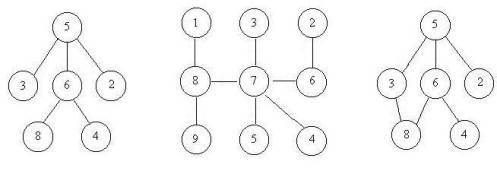并查集(有点坑)
|
纪念我死去的脑细胞们
 ..... ..... 小希的迷宫Time Limit: 2000/1000 MS (Java/Others) Memory Limit: 65536/32768 K (Java/Others) Total Submission(s): 20397 Accepted Submission(s): 6243Problem Description
上次Gardon的迷宫城堡小希玩了很久(见Problem B),现在她也想设计一个迷宫让Gardon来走。但是她设计迷宫的思路不一样,首先她认为所有的通道都应该是双向连通的,就是说如果有一个通道连通了房间A和B,那么既可以通过它从房间A走到房间B,也可以通过它从房间B走到房间A,为了提高难度,小希希望任意两个房间有且仅有一条路径可以相通(除非走了回头路)。小希现在把她的设计图给你,让你帮忙判断她的设计图是否符合她的设计思路。比如下面的例子,前两个是符合条件的,但是最后一个却有两种方法从5到达8。
 Input
输入包含多组数据,每组数据是一个以0 0结尾的整数对列表,表示了一条通道连接的两个房间的编号。房间的编号至少为1,且不超过100000。每两组数据之间有一个空行。 整个文件以两个-1结尾。
Output
对于输入的每一组数据,输出仅包括一行。如果该迷宫符合小希的思路,那么输出"Yes",否则输出"No"。
Sample Input
6 8 5 3 5 2 6 4
5 6 0 0
8 1 7 3 6 2 8 9 7 5 7 4 7 8 7 6 0 0
3 8 6 8 6 4 5 3 5 6 5 2 0 0
-1 -1
Sample Output
Yes
Yes
No
o(︶︿︶)o 唉,我只能说测试数据太水了。。。。。坑啊!!!  #include<iostream> #include<cstdio> using namespace std; int father[100005],k; struct sum { int a; int b; }num[100005]; /* int Find(int x)//找到x所在家族的祖先并路径上成员指向祖先 { return x==father[x] ? x : father[x]=Find(father[x]); }//不用这种递归方式。。。。因为,,,堆栈会溢出 */ int Find(int x) //找出祖先 { while(x!=father[x]) x=father[x]; return x; } void Union(int x,int y) { if(x!=y) father[x]=y; else k=0;//eg: 1 1相等这样是不对的 // printf("%d %d %d %d ",x,father[x],y,father[y]); } int main() { int m,n,i; memset(father,0,sizeof(father));//很重要 i=0; while(scanf("%d%d",&m,&n)!=EOF) { if(m==-1&&n==-1) break; num[i].a=m; num[i].b=n; father[m]=m; father[n]=n; i++; if(m==0&&n==0) { n=i-1; if(n==0)//0 0一开始就是的情况; { printf("Yes "); i=0; memset(father,0,sizeof(father)); continue; } k=1; for(i=0;i<n;i++) { Union(Find(num[i].a),Find(num[i].b)); } int t=0; for(i=1;i<=100000;i++)//排除两个祖先,不连通的情况; if(father[i]==i) t++; if(t!=1) printf("No "); else { if(k) printf("Yes "); else printf("No "); } i=0; memset(father,0,sizeof(father)); } } return 0; } /* 6 8 5 3 5 2 6 4 5 6 0 0 8 1 7 3 6 2 8 9 7 5 7 4 7 8 7 6 0 0 3 8 6 8 6 4 5 3 5 6 5 2 0 0 1 2 1 3 4 5 4 6 0 0 0 0 1 1 0 0 -1 -1 */ |
